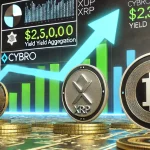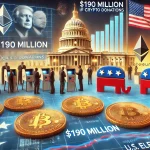As Donald Trump continues to make headlines, his latest involvement in the cryptocurrency world has sparked considerable debate. His newest venture, World Liberty Financial (WLF), promises financial freedom and decentralization but has raised questions about its legitimacy and purpose. With Trump’s family deeply involved in the project, many are wondering: will World Liberty Financial attract a wave of new investors, or is it merely another branding strategy capitalizing on Trump’s fame? This blog post takes an in-depth look at the controversies surrounding WLF, the opinions of industry experts, and whether this venture will live up to its bold promises.
Trump’s Entry Into the Crypto Space: A Bold Move
2024 has been a landmark year for Donald Trump, but not just because of his political ambitions. His growing interest in cryptocurrency has fueled conversations around his role in this new financial frontier. World Liberty Financial, set to launch on September 16, 2024, is positioned as a platform that gives individuals greater control over their finances through decentralized finance (DeFi).
In a recent podcast appearance, Trump confirmed the launch date, followed by a live event announcement from WLF’s X page, scheduled for 8 PM EST from Mar-a-Lago. Here, Trump is expected to unveil the platform’s vision for “making finance great again,” with his sons Eric Trump and Donald Trump Jr. appointed as “Web3 Ambassadors.” But is this venture a genuine innovation in DeFi, or just another Trump business deal?
World Liberty Financial: Promises and Controversies
On the surface, World Liberty Financial makes bold promises: decentralization, financial freedom, and transforming the U.S. into the “crypto capital of the planet.” However, recent leaks and expert analyses suggest that the reality might be different.
CoinDesk obtained a draft of WLF’s white paper, revealing controversial aspects of the project. While WLF claims to empower people, 70% of the platform’s governance tokens, WLFI, will be controlled by founders, team members, and service providers, leaving only 30% available to the public. Even then, part of the proceeds from the public sale will be funneled back to insiders, casting doubt on how decentralized this platform truly is.
The white paper also raises concerns about governance and token distribution. All tokens will be non-transferable and locked indefinitely unless specific governance procedures are followed to unlock them. Legal experts have also noted potential issues with compliance regarding U.S. sanctions laws, raising the question: is World Liberty Financial offering real financial freedom, or is it simply a tool to enrich those at the top?
Crypto Experts Weigh In: Divided Opinions
The crypto community has been quick to respond, with many expressing skepticism about Trump’s involvement in World Liberty Financial. Some believe that this is an opportunity for financial inclusion, while others see it as a risk to Trump’s political image and a potential ethical minefield.
For instance, Adam O’Neill, Chief Marketing Officer at Bitrue, pointed out early red flags surrounding the project. Yuriy Brisov, a partner at D&A Partners, raised concerns about the centralization of power, calling into question the platform’s claim of decentralization. Brisov also noted the potential political implications if Trump were to return to the presidency.
Other experts, like Steve Witkoff, see World Liberty Financial as an opportunity for those locked out of traditional credit systems. Witkoff, reflecting on his own entrepreneurial journey, highlighted the potential for WLF’s DeFi platform to provide credit access to underserved communities.
The Politics of World Liberty Financial: Could It Backfire?
Trump’s name being tied to World Liberty Financial could influence more than just the crypto market. The project’s success or failure could have direct political consequences. According to Suraj Sharma, Global Head of Public Policy at BitBNS, WLF may alienate certain voter demographics. Meanwhile, Nic Carter, a well-known crypto figure, voiced his concerns about WLF damaging Trump’s electoral prospects, especially if the project is targeted by regulators like the SEC.
Given the potential legal challenges and regulatory scrutiny surrounding WLF’s tokenomics, there are real risks. Brisov also mentioned that KYC (Know Your Customer) and AML (Anti-Money Laundering) compliance might not be sufficient, potentially leading to further regulatory issues.
The Future of World Liberty Financial: High Stakes and Uncertainty
Despite the controversies and legal questions, World Liberty Financial continues to push forward. In a recent X thread, WLF made bold claims, stating that their upcoming platform would not only impact DeFi but also the future of the U.S. economy. They have partnered with security firms like Zokyo and PeckShield to address the risks of DeFi hacks, a frequent concern in the space.
WLF’s white paper also highlights its mission to promote U.S.-pegged stablecoins as the global settlement layer, ensuring U.S. dollar dominance. However, some experts question whether this goal is realistic, particularly given increasing regulatory crackdowns and growing resistance to U.S. financial influence on the global stage.
Conclusion: A Project to Watch, but with Caution
World Liberty Financial is a high-stakes venture that promises financial freedom, decentralization, and a new future for the U.S. economy. However, it also comes with significant risks, including questions about its true intentions, regulatory scrutiny, and potential political fallout. As the project launches, investors and political analysts alike will be keeping a close eye on its development.
For those considering WLF as an investment, it’s essential to approach with caution. The platform may offer opportunities, but its structure and governance could lead to challenges down the road.


